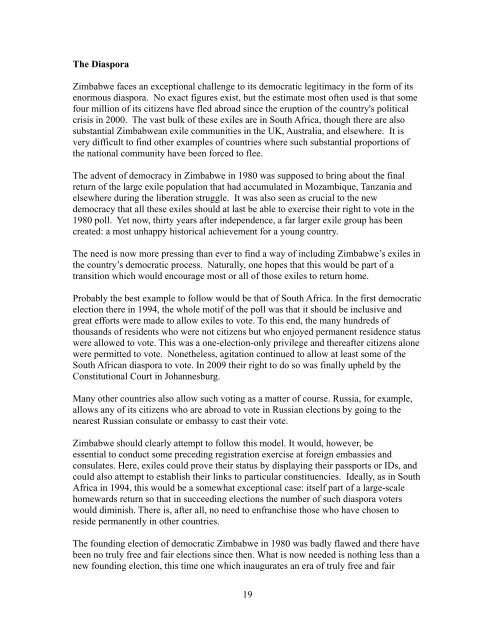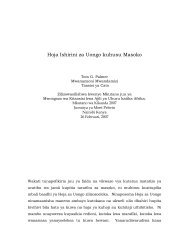Preventing Electoral Fraud report SAIRR May 11 ... - AfricanLiberty.org
Preventing Electoral Fraud report SAIRR May 11 ... - AfricanLiberty.org
Preventing Electoral Fraud report SAIRR May 11 ... - AfricanLiberty.org
Create successful ePaper yourself
Turn your PDF publications into a flip-book with our unique Google optimized e-Paper software.
The Diaspora<br />
Zimbabwe faces an exceptional challenge to its democratic legitimacy in the form of its<br />
enormous diaspora. No exact figures exist, but the estimate most often used is that some<br />
four million of its citizens have fled abroad since the eruption of the country's political<br />
crisis in 2000. The vast bulk of these exiles are in South Africa, though there are also<br />
substantial Zimbabwean exile communities in the UK, Australia, and elsewhere. It is<br />
very difficult to find other examples of countries where such substantial proportions of<br />
the national community have been forced to flee.<br />
The advent of democracy in Zimbabwe in 1980 was supposed to bring about the final<br />
return of the large exile population that had accumulated in Mozambique, Tanzania and<br />
elsewhere during the liberation struggle. It was also seen as crucial to the new<br />
democracy that all these exiles should at last be able to exercise their right to vote in the<br />
1980 poll. Yet now, thirty years after independence, a far larger exile group has been<br />
created: a most unhappy historical achievement for a young country.<br />
The need is now more pressing than ever to find a way of including Zimbabwe’s exiles in<br />
the country’s democratic process. Naturally, one hopes that this would be part of a<br />
transition which would encourage most or all of those exiles to return home.<br />
Probably the best example to follow would be that of South Africa. In the first democratic<br />
election there in 1994, the whole motif of the poll was that it should be inclusive and<br />
great efforts were made to allow exiles to vote. To this end, the many hundreds of<br />
thousands of residents who were not citizens but who enjoyed permanent residence status<br />
were allowed to vote. This was a one-election-only privilege and thereafter citizens alone<br />
were permitted to vote. Nonetheless, agitation continued to allow at least some of the<br />
South African diaspora to vote. In 2009 their right to do so was finally upheld by the<br />
Constitutional Court in Johannesburg.<br />
Many other countries also allow such voting as a matter of course. Russia, for example,<br />
allows any of its citizens who are abroad to vote in Russian elections by going to the<br />
nearest Russian consulate or embassy to cast their vote.<br />
Zimbabwe should clearly attempt to follow this model. It would, however, be<br />
essential to conduct some preceding registration exercise at foreign embassies and<br />
consulates. Here, exiles could prove their status by displaying their passports or IDs, and<br />
could also attempt to establish their links to particular constituencies. Ideally, as in South<br />
Africa in 1994, this would be a somewhat exceptional case: itself part of a large-scale<br />
homewards return so that in succeeding elections the number of such diaspora voters<br />
would diminish. There is, after all, no need to enfranchise those who have chosen to<br />
reside permanently in other countries.<br />
The founding election of democratic Zimbabwe in 1980 was badly flawed and there have<br />
been no truly free and fair elections since then. What is now needed is nothing less than a<br />
new founding election, this time one which inaugurates an era of truly free and fair<br />
19



